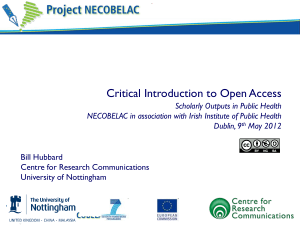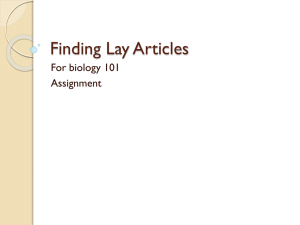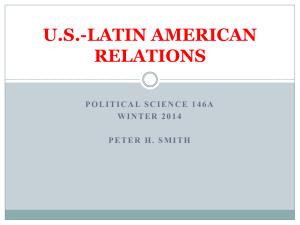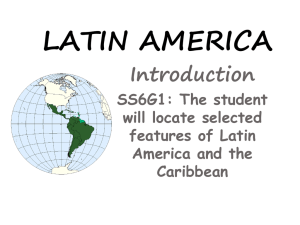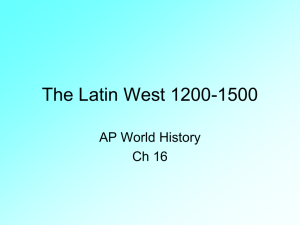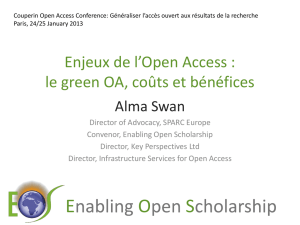Slides - OASPA
advertisement
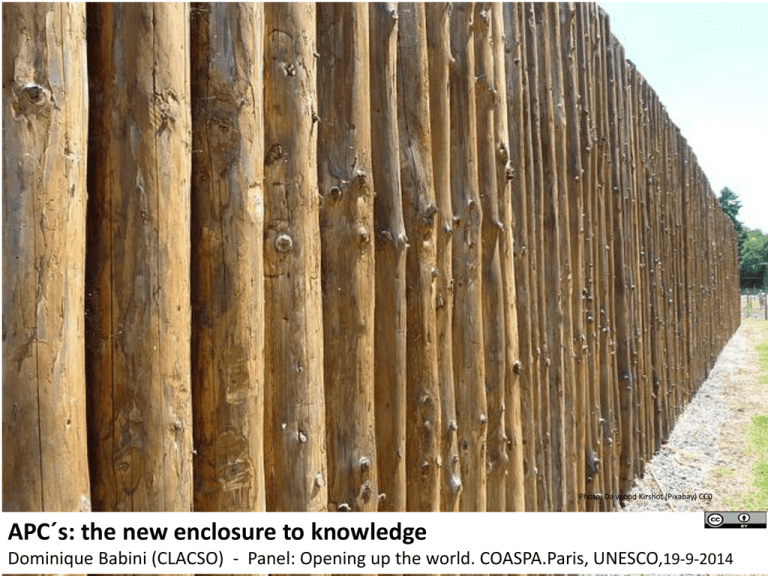
Photo: Da vgood Kirshot (Pixabay) CC0 APC´s: the new enclosure to knowledge Dominique Babini (CLACSO) - Panel: Opening up the world. COASPA.Paris, UNESCO,19-9-2014 we have to make an ongoing series of decisions all of the time… we have to think about who is being included and who is being excluded……. ….. what seems open to us today, we have to ask ourselves …will this seem open tomorrow? John Willinsky Opening Science to Meet Future Challenges, 11 March 2014, Warsaw https://www.youtube.com/watch?v=jODzw_5q7EU sharing today with you two concerns • APC´s are not for everyone How we move forward building a future global open access which is inclusive of diverse realities and possibilities • Local and regional contents and voices can and should be part of that future OA How we take care and value quality and relevance of that input in local and global conversations International Council for Science (ICSU) advocates the following goals for open access The scientific record should be: • free of financial barriers for any researcher to contribute to; • free of financial barriers for any user to access immediately on publication; • Made available without restriction on reuse for any purpose, subject to proper attribution; • quality-assured and published in a timely manner; and • archived and made available in perpetuity http://www.icsu.org/generalassembly/news/ICSU%20Report%20on%20 Open%20Access.pdf Proyecto Ñandu-Center Applied Zoology, National University of Córdoba, Argentina team of 5 doing biological research on the ecology of endangered species, in particular the Ñandu (Rhea) Costs they need to cover with project grants each year: - field work + truck maintenance - presentation of results in 2 internacional conferences - 4 articles/year in international journals Project grants 2014: National Research council grant for fieldwork: USD 10.000/year University grant for fieldwork: USD 1,200/year Average salary of university researchers mid-career: USD 15,600 /year Since 2014, publishing requires APC´s from the project: Article in PLOS: USD 800 (discount included) Article in Revista Chilena de Historia Natural, recently purchased by international publisher, and now charging APC´s: USD 904 (discount included) global conversations inclusive of voices from the global South Global “basic open access” managed as a commons (free to read – free to publish) Value-added services with diversity of business models secure basic open access (no fee for users, no fee for publishing) • Research output in shared interoperable open access digital repositories – – – – – – institutional national regional international Thematic Journal repositories (70% journals do not charge APC´s) payed valueadded services by repositories, overlay journals, megajournals, epijournals, publishers, data portals, peer-review services, impact services, etc. “By making available research generated in poor countries in addition to knowledge created in wellendowed institutions, institutonal repositories could play a role in bridging the global knowledge gap. Research institutions and universities have the primary mission of creating, sharing, and disseminating knowledge, which are public goods. Open access through institutional repositories is a low-cost and lowbarrier strategy for achieving this mission”. Leslie Chan (2014, p.295) http://cjc-online.ca/index.php/journal/article/view/1455/1579 Joshc uni Wikimedia a way forward in developing regions the case of Latin America regional Open Access declaration (2005) Salvador de Bahía (Brazil) Declaration on Open Access: The Developing World Perspective (promoted by SciELO) We urge governments to make Open Access a high priority in science policies including: • requiring that publicly funded research is made available through Open Access; • considering the cost of publication as part of the cost of research; • strengthening the local OA journals, repositories and other relevant initiatives; • promoting integration of developing countries scientific information in the worldwide body of knowledge. We call on all stakeholders in the international community to work together to ensure that scientific information is openly accessible and freely available to all http://www.icml9.org/meetings/openacces s/public/documents/declaration.htm Latin America: tradition of shared information systems agriculture labour SUBJECT REPOSITORIES public administration Environmental health health Social sciences Latin America: early and widespread adoption of Open Access for journal publishing with no APC´s Peer-review OA journals from Latin America Latindex: 2.662 DOAJ: 1.821 . . • Started 1997 • Today 1.007 journals LAC • 435.175 articles LAC • Started 2003 • Today 768 journals LAC • 276.814 full-text articles LAC • Bibliometric indicators • Scielo Citation Index WoS • Indicators of scientific output (institutions, countries, subjects) Improved quality, visibility, open access and impact of scholarly journals Development of Open Access indicators Collaborative research on Open Access outreach and impact in Latin America Regional journals harvester: Portal de Portales Latindex www.latindex.ppl.unam.mx/ research output poorly represented in international indexes From a total of 5.415 peer-review journals from Latin America and the Caribbean (Latindex) 16 % in Scopus (841 Journals) 5 % in WoS (294 journals) Source: Juan Pablo Alperín (2014). World scaled by number of documents in Web of Science by Authors Living There. LSE Impact Blog . . . Latin America: recent development of institutional repositories Institutional repositories 282 repositories Latin America Regional cooperation Since: 2012 Members: national networks of digital repositories Members: 9 countries Argentina,Brasil,Chile,Colombia, Ecuador, México,Perú,Venezuela, El Salvador Regional harvester: initial 606.450 digital objects Working with COAR Support from: governments, IADB, RedCLARA University journal portals in Latin America e. g. with more than 100 journals (OJS/PKP) UNAM, México USP, Brazil revistas.unam.mx http://www.revistas.usp.br Univ. Chile http://www.revistas.uchile.cl/ Latin America: weak institutional mandates, strong national legislation Latin America Open Access policies Institutional • Few (13 registered in ROARMAP) • Weak (recommendations more than mandates) • Partial (Mainly for thesis) – A good example of mandatory institutional policy: University of São Paulo (Brazil) National • AO legislation approved by Congress – Peru (2013) – Argentina (2013) – Mexico (2014) Requires creation of OA digital repositories for gov.-funded research results • OA legislation in Congress – Brazil (since 2007) Regional strategy for Latin America and the Caribbean Recommendations from Regional Consultation on Open Access to Scientific Information (UNESCO, Kingston, March 2013 - 23 countries represented) • Gold and Green routes are suitable form of OA for the region – For Green routes, inclusive and cooperative OA solutions should be promoted to avoid new enclosures – the Gold OA route in the region should continue its present emphasis on sharing costs. http://www.unesco.org/new/fileadmin/MU LTIMEDIA/HQ/CI/CI/pdf/news/report_open _access_en.pdf challenges for Latin America • Risks of APC´s business model: is it sustainable? Do we have evidence of regional benefits? who´s business do we support? • Scholarly production relevant for local needs for global scientific conversation (language, journal, evaluation) • Regional interoperability of digital repositories (national, institutional, subject, journals) • More awareness and use of OA licences • Open access and open data as part of open science • Review evaluation to reward quality and relevance of articles, more than journals + IF • Build and analyze open access indicators • • • • • • • • • Adams, Caralee (2014) . Open Access in Latin America: Embraced as key to visibility of research outputs. SPARC. http://www.sparc.arl.org/news/open-access-latin-america-embraced-keyvisibility-research-outputs Alperin, Juan Pablo; Gustavo E. Fischman, John Willinsky (2011. Scholarly Communication Strategies in Latin America´s Research-Intensive Universities. Educación Superior y Sociedad, Vol 16, No 2). http://ess.iesalc.unesco.org.ve/index.php/ess/article/view/409/347 Alperin, Juan Pablo (2014). Altmetrics could enable scholarship from developing countries to receive due recognition. LSE impact Blog. http://blogs.lse.ac.uk/impactofsocialsciences/2014/03/10/altmetrics-for-developing-regions/ Babini, Dominique, (2012). Scientific Output from Latin America and the Caribbean – Identification of the Main Institutions for Regional Open Access Integration Strategies. Available at SSRN: http://ssrn.com/abstract=2125996 Chan L, Kirsop B, Arunachalam S (2011) Towards Open and Equitable Access to Research and Knowledge for Development. PLoS Med 8(3) http://www.plosmedicine.org/article/info%3Adoi%2F10.1371%2Fjournal.pmed.1001016 Hess, Charlotte and Elinor Ostrom., eds. (2006). Understanding Knowledge as a Commons. MIT Press UNESCO-GOAP Global Open Access Portal-Latin America and the Caribbean http://www.unesco.org/new/en/communication-and-information/portals-andplatforms/goap/access-by-region/latin-america-and-the-caribbean/ UNESCO (2013)- Report Regional Consultation Open Access www.unesco.org/new/fileadmin/MULTIMEDIA/HQ/CI/CI/pdf/news/report_open_access_en.pdf Vessuri, Hebe, Jean-Claude Guédon, Ana María Cetto (2013). Excellence or quality? Impact of the current competition regime on science and scientific publishing in Latin America and its implications for development. Current Sociology, December 4, 2013. http://csi.sagepub.com/content/early/2013/12/02/0011392113512839 Thank you!!!! Dominique Babini – CLACSO, Open Access Program University of Buenos Aires/IIGG – Open Access Project @dominiquebabini dasbabini@gmail.com

